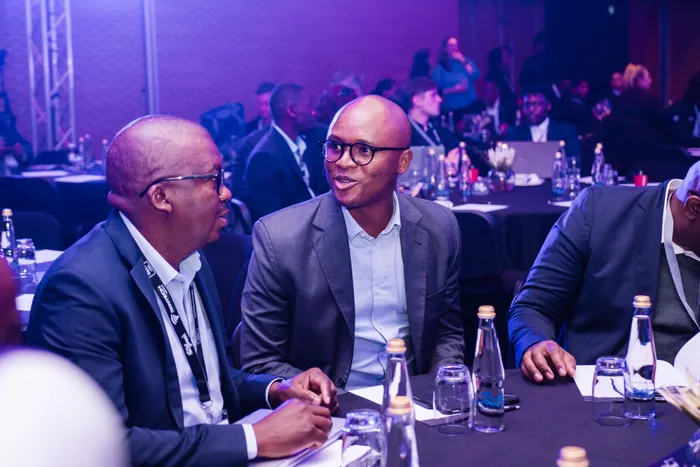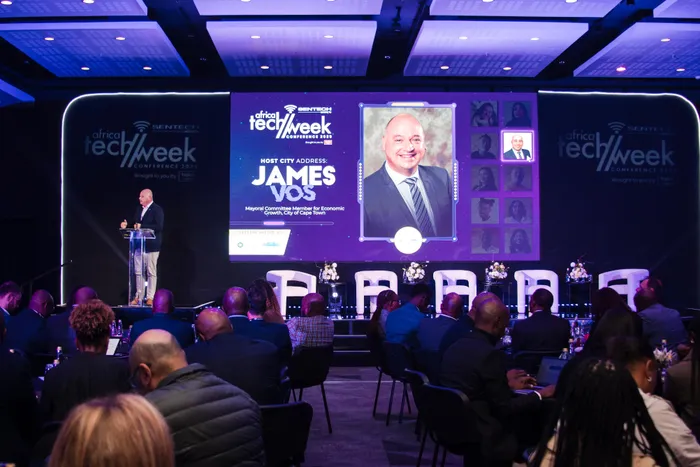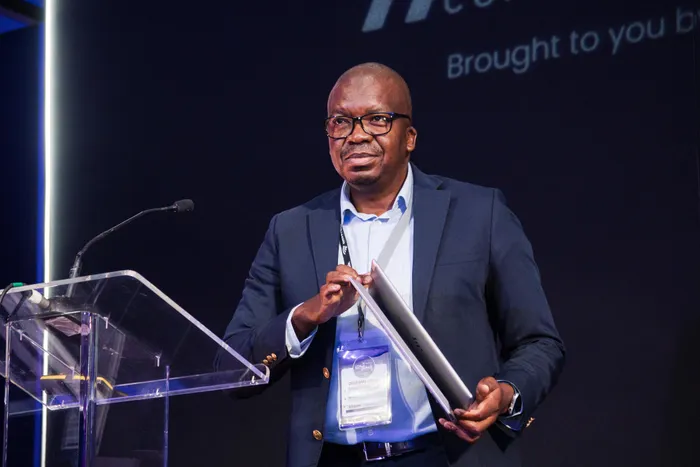Malatsi addresses Starlink concerns, insists the country’s data must be protected

Minister of Communications and Digital Technologies Solly Malatsi, right, seen talking to Sentech CEO, Tebogo Leshope, at the Sentech Africa Tech Week taking place in Cape Town.
Image: Supplied
Minister of Communications and Digital Technologies Solly Malatsi used his address at the Sentech Africa Tech Week to not only explain the country's approach to its digital sovereignty but that the recent gazette he issued is to bring the country in line with international best practice.
The conference is currently underway at the Century City Conference Centre in Cape Town and has featured talks by Mayco Member for Economic Growth, James Vos, Sentech CEO, Tebogo Leshope, Topco Media CEO, Ralf Fletcher, Data and also AI Specialist, Google Cloud, Manav Daby, among others.
The minister delivered his address to tech innovators, and leaders where his speech focused on “South Africa’s Strategic Approach to Data Sovereignty”. He mentioned how through collaboration between the public and private sector, South Africa has quickly become a leading hub for data centres and cloud computing.
“To fully unlock the potential of data as a national asset, that further drives our competitiveness, economic growth and public service delivery, the government is committed to a regulatory framework that creates that environment for growth, and does not stifle innovation.
“At the same time, we acknowledge the responsibility of protecting our national and public interest in aspects of our data. The past few years have demonstrated the growing confidence that global cloud leaders have placed in South Africa, and our strategic approach to data sovereignty,” Malatsi said.
He said that the country’s current cloud market’s value is expected to surge to beyond R130 billion in 2028, and that major international players such as Amazon, Google, and Microsoft are key contributors to this growth.
“This growth does not only represent our increased technological capacity, but it represents jobs for young people, skills development for the future economy, and improved service delivery.
“Looking forward, our strategic approach to data sovereignty will focus on maintaining the competitiveness of the local cloud market, while staying responsive to the rapidly evolving needs and capacities of this sector,” Malatsi said.

The conference is currently underway at the Century City Conference Centre in Cape Town and has featured talks by Mayco Member for Economic Growth, James Vos,
Image: Supplied
“Our approach is based on four basic pillars - firstly, by acknowledging that not all data is equally sensitive and requires the same level of regulation (that) we are implementing in a risk-based approach. So it is this distinction between general commercial data and critical sovereign data that our national policy on data and clouds allows for the free-flow of this data, while (still) protecting our national interest.
Malatsi said government is serious about creating a regulatory strategy which will help pursue by aligning data regulations with international best practices.
“Thirdly, we realise the importance of developing world-class digital infrastructure so that we can demonstrate to the rest of the world that we are truly open for business and that we can take them also beyond the boundaries of Cape Town.
“We believe the expansion of local data regions and data centres is crucial for this purpose.
He said he understood that the country's regulatory role is critical for private sector investment.
“And lastly, we are consistently driving to maintain the resilience and relevance of cyber security mechanisms so that we can earn and invest trust in our national digital ecosystem.
“Data sovereignty means little without cyber resilience. Having our data physically located within our boundaries is only one piece of the puzzle. We must also ensure that it is encrypted, it is monitored, and recoverable in the face of threats.”
Malatsi, speaking on the sideline of the conference said the recent policy directive proposal to the Independent Communications Authority of South Africa (ICASA) requires it to investigate whether to open up applications for individual electronic communications network services (ECNS) licences.
The directive coincided with engagements between Presidents Cyril Ramaphosa and Donald Trump during a trip to the United States - including controversial suggestions that Elon Musk's Starlink should be given priority in the country.
“The protection of the country’s data is sacrosanct, and that is the case for every country in the world. What we equally have to do is ensure that we keep abreast with international best practice in this case.
“We (also) have to ensure that we are properly equipped to respond to the threats that exist in this space, where there are constant efforts by nefarious elements, globally, to intercept state data to gain unauthorised access to it, and to ensure that in the unlikely event that such happens, we can retrieve it promptly, quickly and protect citizens from any potential harm.”

Sentech CEO, Tebogo Leshope.
Image: Supplied
Leshope, who separately was addressing how satellite technology is used for innovation, said: “Innovation nowadays happens on top of a base… All the other innovations happening on top of satellite technology include connecting cars, connecting human beings and all those opportunities that come with that.
“If you fall behind on the base of it, you won’t be able to participate first on the innovation side, and you won’t be able to leverage that particular solution.
“So that is how far behind you can become. All the future innovation and development that is going to happen there, which will be to the benefit of your communities, you are going to miss out. Now we can connect our communities far cheaper with those solutions, but if you don’t have a base, and you’re not part, you lose out on that, and you remain on the most expensive terrestrial options.”
theolin.tembo@inl.co.za